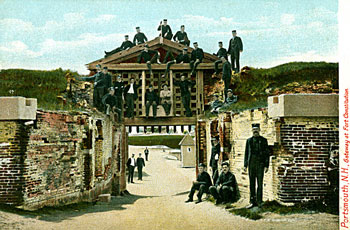
Negotiations, Part 4:
August 17, Thursday: Articles IX (Expenses of War) and X (Limit Naval Strength); Roosevelt Asked to Help
By Thursday, August 17, most of the other issues having been resolved, Witte and Komura debated without success the four remaining demands:
- Russian ships in neutral ports (Demand X)
- limitations on Russia's Far East fleet (Demand XI)
- Sakhalin Island (Demand V, Treaty Article IX)
- the indemnity (Demand IX)

Witte was under orders from the Tsar not to pay an indemnity. Harper's Weekly. View larger image.

President Roosevelt, fearful of an imbalance of power in the Far East, was eager to assist Japan and Russia to resolve their differences. Harper's Weekly. View larger image.
Following heated discussions during morning and afternoon sessions, Witte told Komura he would no longer discuss the indemnity (Demand IX) nor Sakhalin (Demand V), and that Friday’s session would be devoted to Japanese fishing rights (Demand XII, Treaty Article XI). This was a pivotal day, since fearing that the peace conference might end without an agreement, both Witte and Komura sent telegrams home seeking advice and support. In four messages to the Tsar, Witte expressed doubts about the success of the conference, believing the parties were deadlocked and unwilling to compromise over Sakhalin and the indemnity. Witte told the Tsar he believed Russia should give up Sakhalin since the Japanese were already in control. (See Map of Articles IX and XI.)
Likewise, Komura told Tokyo the conference would probably end in a couple of days without a signed treaty. He proposed giving up the demands calling for Russia to surrender their interned ships (Demand X) and limiting Russian naval strength in the Far East (Demand XI). Since Roosevelt had earlier indicated he was willing to act if the conference reached an impasse, Komura sent Kaneko to ask the president for his help.
August 18, Friday: Komura Compromise, Niles Cottage State Dinner
At Friday's formal session, Komura, before hearing from his government, on his own initiative, offered to drop the demands regarding the Russian navy and interned ships, if Witte, in a spirit of conciliation, would agree to continue the discussion of Sakhalin and the indemnity. Rather than dictating a formal reply, Witte asked for a private session with just the four plenipotentiaries attending. In that meeting, Witte explained that he had strict orders regarding the two issues. He said the national sentiment was to continue the war and that Russians were opposed to giving up Sakhalin and paying any indemnity. He, however, was personally anxious to see peace restored and suggested that a payment, not to exceed the cost of the care of the Russian prisoners, was possible and he asked if Komura would accept a partition of Sakhalin.
Komura replied that Japanese sentiment was also opposed to surrendering Sakhalin and dropping an indemnity. In a spirit of mutual concessions, Komura asked if Japan agreed to split Sakhalin, would Russia pay an indemnity of at least 1,200 billion yen, essentially selling back the northern half to Russia. Witte expressed doubts that this indemnity would succeed, but acceded to Komura's request to consult his government on the issue. The parties set the next session for Tuesday, August 22, to allow time to consult with their governments.
Meeting on Friday with Kaneko, Roosevelt immediately agreed to use his "good offices" to resolve the deadlock and he asked Witte to send a representative to meet with him.
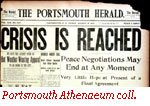 On Friday, August 18, the Portsmouth Herald headlined, "Crisis is Reached: Peace Negotiations May End at Any Moment. Very Little Hope at Present of a Final Agreement." The Herald said "The Russian envoys say that they would never be forgiven if they agreed to the payment of money and the giving up of their country's territory. The Japanese assert that they would be forever disgraced if they placed their signatures to a treaty which did not include those points."
On Friday, August 18, the Portsmouth Herald headlined, "Crisis is Reached: Peace Negotiations May End at Any Moment. Very Little Hope at Present of a Final Agreement." The Herald said "The Russian envoys say that they would never be forgiven if they agreed to the payment of money and the giving up of their country's territory. The Japanese assert that they would be forever disgraced if they placed their signatures to a treaty which did not include those points."
Friday evening the Russians attended a state dinner at the Niles' cottage hosted by Secretary Peirce and his wife and prominent people from Portsmouth and summer people from the Hotel Wentworth and elsewhere.
The Tenth Artillery Corps Band also played at the occasion. A renowned U. S. Military Band from Fort Banks, Boston, the band was assigned by the U. S. Army to Fort Constitution in New Castle during the delegates’ stay. The band played at the Wentworth Hotel at a specially constructed bandstand and at other delegate social occasions, at Fort Constitution, and for the governor and mayor of Portsmouth throughout the area during the negotiations.
August 19, Saturday: Back Channel - Roosevelt Meets Rosen
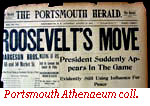 On Saturday Roosevelt secretly met with Baron Rosen at the summer White House seeking some sort of Russian compromise. This effort produced little hope towards resolution of the impasse. Roosevelt then turned his attention to the Tsar and to the Japanese government directly.
On Saturday Roosevelt secretly met with Baron Rosen at the summer White House seeking some sort of Russian compromise. This effort produced little hope towards resolution of the impasse. Roosevelt then turned his attention to the Tsar and to the Japanese government directly.
Both delegations were invited to the York Country Club. The delegates were given full cards of admission to the Portsmouth Athletic Club where some were visitors. The Russians and Japanese enjoyed the hospitality of the club and some proved to be expert pool and billiard players.
During their stay, the Russians met Portsmouth Russian Jewish merchants at Goodman's Store on Market St. in Portsmouth. Speaking the Russian language, the local Jewish merchants translated for the Russians as they shopped in Portsmouth and discussed the treatment of Jews in Portsmouth versus their treatment in Russia.
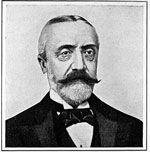
At Roosevelt's request, Witte sent Baron Rosen to meet with the president at Sagamore Hill. Harper's Weekly.
August 20, Sunday: Church and U.S.S. Mayflower Social Event
The tension of the debate paused on Sunday when members of both delegations attended Christ Church in Portsmouth. Upon leaving the service, Minister Takahira met his old American teacher, Professor Clark—a Portsmouth native who had taught at Tokyo's Imperial University.
In the afternoon, members of both delegations accepted Oscar Laighton's invitation to visit Appledore House at the Isles of Shoals. Secretary Peirce, Governor McLane and the social hostesses, along with the U. S. Navy, hosted the party on board the U.S.S. Mayflower for a lunch stop at Appledore together with many local politicians and other local guests. Witte, no lover of the ocean, went for another automobile ride to his now favorite local site, York Beach, and socialized with the summer visitors there.

The Russians and the Japanese attended services at Christ Church. Richard Candee collection. View larger image.

The Mayflower. Portsmouth Athenaeum collection. View larger image.

Appledore House, Isles of Shoals. This photo, with what appears to be a Japanese flag and a marching band, may have been taken on the day the envoys visited the island. Courtesy Susy Mansfield. View larger image.

Witte, who enjoyed riding in an automobile and meeting the locals, made repeated visits to York Beach. Richard Candee collection. View larger image.
August 21, Monday: Roosevelt Back Channel Efforts
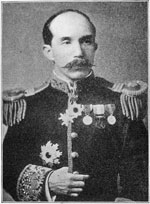
Kentaro Kaneko worked closely with Roosevelt. Harper's Weely.
On Monday, Roosevelt met with Kaneko and supported the Komura compromise on Sakhalin but suggested reducing the indemnity to 600 million yen. Meanwhile, Roosevelt initiated a series of secret behind the scenes diplomatic initiatives, known as back channel diplomacy. The president sent a message to the Tsar, hand delivered by Ambassador George Meyer, urging Nicholas to accept the Japanese proposal but suggesting that the amount of the indemnity could be worked out later. During this period, Roosevelt sent telegrams to leaders in Germany, France and Britain urging their support for this peaceful compromise. The German emperor, who had influence with the Czar, encouraged the Czar to compromise.
A memorial was presented to Witte and Rosen at the Wentworth Hotel by a group of Russian Jews from Lawrence, Massachusetts, who earnestly wished Witte and Rosen success in bringing peace to their former homeland. About 600 Russian Jews from Lawrence signed the document.

